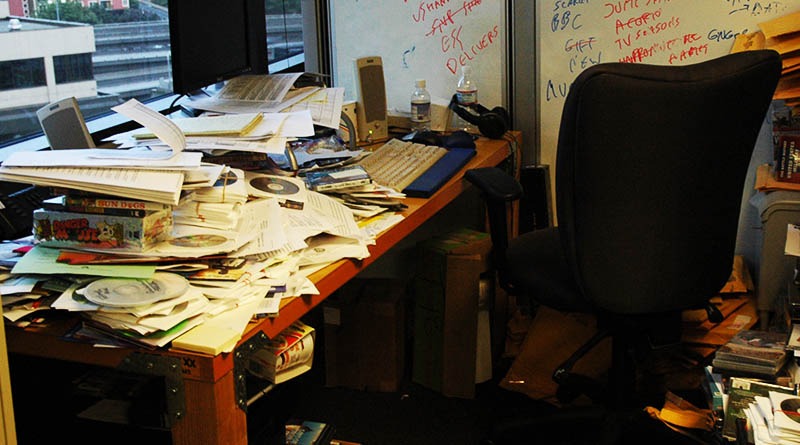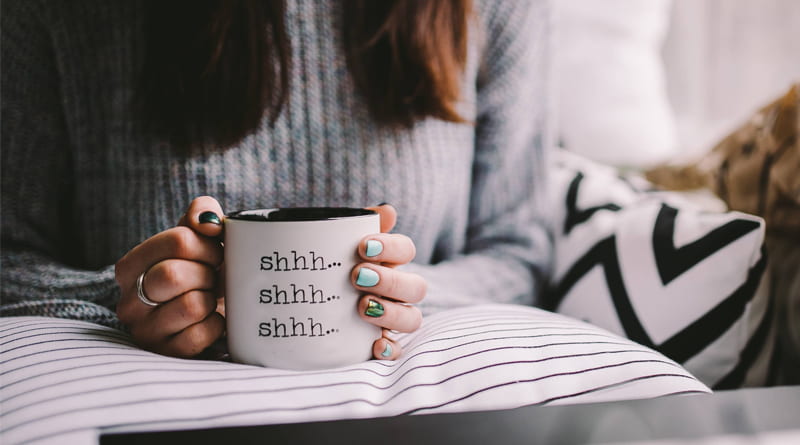
How Mess Equates to Stress
By Amelia Zannoni
Mess = Stress
“I’ll hang those clothes up after I get my work done,” I tell myself as I change from the clothes of the day to the lounge wear I put on while I do my homework. The truth is though, this is a harmful deception of procrastination. One unworn jacket will turn into two, and one failed try on will lead to a pile of clothes sitting in a basket in my closet, wasting away. This issue may seem unrelated to my mental health, however, the two are very closely linked.
As I walk the sunny sidewalk to the library of my University, I think of all the assignments due, the papers to be written, the topics to be understood, the test to do well on, and finally in the back of my mind, the dirty closet sneaks back up, taunting me. As far as I am from that dirty closet, it never fails to creep up on me, reminding me that it’s there. The clothes aren’t going to fold themselves, hang themselves, or put themselves away. Then I remember the dishes in the sink, the books on the counter, the specks on the floor. Suddenly, “I’ll hang these clothes up after I get done with my work,” turns into my mind wandering on all the other clutter and mess I’ve yet to get done.
After my long day at University, the hours afterwards spent studying, and the time in between spent working remotely at my jobs, I get to go home to the dishes staring at me, the clothes taunting me, the specks of dirt laughing at me. They’ve succeeded, there’s too much now to get done at this time of night, and I am exhausted. I shower, lay in bed, and leave the clutter for the next day of torment and torture… Where there’s a mess, there’s bound to be stress.
Clutter… turns into a center of added stress on our mental load… Constant visual reminders of disorganization sends our brain, which favors order over anything, into a panic, reducing our ability to focus.
How Clutter has a Negative Effect on Our Brain
Numerous studies have recently shown evidence supporting the narrative that the brain prefers working on one task versus multitasking. While others may be able to juggle more than one task more successfully, the overall consensus states that humans remember, recall, and understand things better when only focusing on one task. Clutter, although by definition is an inanimate object, turns into a center of added stress on our mental load. Mess is often also connected to our productivity, eating, and parenting decisions, as well as how we handle our money.
Constant visual reminders of disorganization sends our brain, which favors order over anything, into a panic, reducing our ability to focus. In 2011, neuroscience researchers recorded evidence using FMRI (Functional magnetic resonance imaging) and other physiological measurements that prove to be in favor of the idea that clearing clutter from one’s environment resulted in a better ability to focus and process information, this leading to an increase in productivity.
Not Only Cognitively Damaging…
Mess has the ability to make us feel stressed, anxious, and depressed. This may be affecting women more than men. One research article from 2009, found elevated stress hormone levels in mothers whose home environment was cluttered. When people’s stress levels are heightened, this often leaves us in a survival response mode; easily on edge and anxious. When the stress hormones are heightened, this has a physical effect on how we digest food, and how we fight infections, leaving people at a higher risk of heart disease, amongst other ailments.
And this torture of a cluttered environment follows us, even when we lay our head down to go to bed. Studies have shown those sleeping in a cluttered room are more likely to have sleep problems.
There is a Mess and I am Stressed! Is There Any Solution?
Yes. Luckily for us, there is a solution. It’s vital to remember you have authority over what matters to you and how you prioritize your time.
Speaking from my own experience, I do not allow the mess of the closet to control me (or I am trying my absolute best to not let it control me anymore!) I prioritize days where I can clean my home. For example, every Saturday I hang up all the failed try on outfits from the prior week, I wash the dirty clothes and change my sheets. When my closet is clean, I take a breath of relief. The dirty clothes have lost today!
You can also take advantage of a technique called “Micro Tidying”. Micro Tidying essentially means you commit five minutes to clearing up one small space. For this, I usually put on the classic Lynyrd Skynyrd song, “Free Bird,” and spend the entire duration of the song cleaning up one space, or doing one task.
When I do this, I allow myself to only focus on the task at hand; for example, sweeping the floor. By the end of the 9 minute song, my entire floor is swept and I no longer can stress about it for the rest of the week. On the other hand, when the floor inevitably builds up more dirt on it as the week goes on, I remind myself I am cleaning this on Saturday, I will not stress about it today.
The important thing is to acknowledge that mess doesn’t define whether you are a “clean” person or “dirty” person; mess happens to all of us living, breathing, humans. At some point, it’s vital to stop the stress, and clean the mess. Stop the procrastination and reduce the clutter. Put the dishes in the dishwasher every night, and hang the clothes up right after you’ve tried them on… this will allow you to leave the survival mode and enter into the calm and relaxed mode when you get home from your busy day.
One small space at a time.
REFERENCES
- Penney, E. (2023). Why household mess triggers stress and anxiety. Neurosciencenews.com
- Pashler, H. (1994). Dual-task interference in simple tasks: Data and theory. Psychological Bulletin, 116(2), 220–244. https://doi.org/10.1037/0033-2909.116.2.220
- Sander, L. (2019). What does clutter do to your brain and body? The Conversation
- McMains, S., Kastner, S.. (2011). Interactions of top-down and bottom-up mechanisms in human visual cortex. Journal of Neuroscience. 31(2) 587-597. DOI: https://doi.org/10.1523/JNEUROSCI.3766-10.2011
- Gaspar, J. M., Christie, G. J., Prime, D. J., Jolicœur P., McDonald, J.J.. (2016). Inability to suppress salient distractors predicts low visual working memory capacity. Proceedings of the National Academy of Sciences. 113(13) 3693-3698. https://doi.org/10.1073/pnas.152347111

Amelia Zannoni is currently an undergraduate student at Nova Southeastern University studying neuropsychology. She is currently studying how neuropathologies work and hopes to go onto developing many beneficial techniques in her field.




